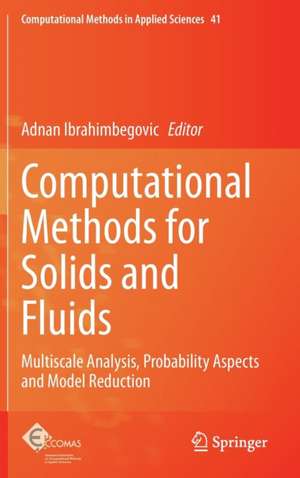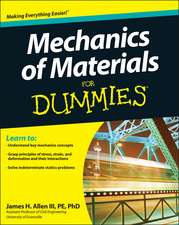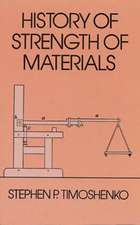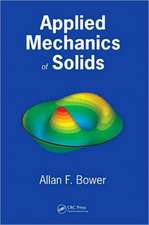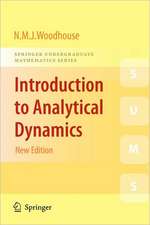Computational Methods for Solids and Fluids: Multiscale Analysis, Probability Aspects and Model Reduction: Computational Methods in Applied Sciences, cartea 41
Editat de Adnan Ibrahimbegovicen Limba Engleză Hardback – 25 feb 2016
Topics dealt with include multiscale strategy for efficient development of scientific software for large-scale computations, coupled probability-nonlinear-mechanics problems and solution methods, and modern mathematical and computational setting for multi-phase flows and fluid-structure interaction.
The papers consist of contributions by six experts who taught short courses prior to the conference, along with several selected articles from other participants dealing with complementary issues, covering both solid mechanics and applied mathematics.
| Toate formatele și edițiile | Preț | Express |
|---|---|---|
| Paperback (1) | 650.69 lei 6-8 săpt. | |
| Springer International Publishing – 14 mar 2019 | 650.69 lei 6-8 săpt. | |
| Hardback (1) | 657.25 lei 6-8 săpt. | |
| Springer International Publishing – 25 feb 2016 | 657.25 lei 6-8 săpt. |
Din seria Computational Methods in Applied Sciences
- 15%
 Preț: 655.27 lei
Preț: 655.27 lei - 15%
 Preț: 651.51 lei
Preț: 651.51 lei - 15%
 Preț: 657.73 lei
Preț: 657.73 lei - 5%
 Preț: 709.87 lei
Preț: 709.87 lei - 18%
 Preț: 1116.26 lei
Preț: 1116.26 lei - 18%
 Preț: 947.35 lei
Preț: 947.35 lei - 18%
 Preț: 1224.54 lei
Preț: 1224.54 lei - 18%
 Preț: 952.89 lei
Preț: 952.89 lei - 18%
 Preț: 947.35 lei
Preț: 947.35 lei - 20%
 Preț: 653.38 lei
Preț: 653.38 lei - 18%
 Preț: 954.45 lei
Preț: 954.45 lei - 15%
 Preț: 638.76 lei
Preț: 638.76 lei - 18%
 Preț: 1005.74 lei
Preț: 1005.74 lei - 20%
 Preț: 648.59 lei
Preț: 648.59 lei - 18%
 Preț: 954.45 lei
Preț: 954.45 lei - 20%
 Preț: 640.19 lei
Preț: 640.19 lei - 18%
 Preț: 1231.16 lei
Preț: 1231.16 lei - 24%
 Preț: 789.36 lei
Preț: 789.36 lei - 18%
 Preț: 946.41 lei
Preț: 946.41 lei - 20%
 Preț: 567.62 lei
Preț: 567.62 lei - 15%
 Preț: 639.25 lei
Preț: 639.25 lei - 18%
 Preț: 952.57 lei
Preț: 952.57 lei - 15%
 Preț: 636.80 lei
Preț: 636.80 lei - 15%
 Preț: 650.69 lei
Preț: 650.69 lei - 18%
 Preț: 952.26 lei
Preț: 952.26 lei - 18%
 Preț: 1239.99 lei
Preț: 1239.99 lei - 5%
 Preț: 716.65 lei
Preț: 716.65 lei
Preț: 657.25 lei
Preț vechi: 773.23 lei
-15% Nou
Puncte Express: 986
Preț estimativ în valută:
125.76€ • 131.66$ • 104.06£
125.76€ • 131.66$ • 104.06£
Carte tipărită la comandă
Livrare economică 05-19 aprilie
Preluare comenzi: 021 569.72.76
Specificații
ISBN-13: 9783319279947
ISBN-10: 3319279947
Pagini: 350
Ilustrații: XII, 493 p. 224 illus. in color.
Dimensiuni: 155 x 235 x 29 mm
Greutate: 0.89 kg
Ediția:1st ed. 2016
Editura: Springer International Publishing
Colecția Springer
Seria Computational Methods in Applied Sciences
Locul publicării:Cham, Switzerland
ISBN-10: 3319279947
Pagini: 350
Ilustrații: XII, 493 p. 224 illus. in color.
Dimensiuni: 155 x 235 x 29 mm
Greutate: 0.89 kg
Ediția:1st ed. 2016
Editura: Springer International Publishing
Colecția Springer
Seria Computational Methods in Applied Sciences
Locul publicării:Cham, Switzerland
Public țintă
ResearchCuprins
Preface.- Multiscale analysis as a central component of urbanphysics modeling, by Benoit Beckers.- A path-following method based on plastic dissipationcontrol, by Bostjan Brank et al..- Improved implicit immersed boundary method via operatorsplitting, by Cai Shang-Gui et al..- Modelling wave energy conversion of asemi-submerged heavy cylinder, by Cai Shang-Gui et al..- Multi-scale modelingof imperfect interfaces and applications, by Serge Dumont et al..- A stochasticmulti-scale approach for numerical modeling of complex materials – applicationto uniaxial cyclic response of concrete, by Jehel Pierre and George Deodatis.- Relatingstructure and model, by Ivica Kozar.- Fat Latin hypercube sampling andefficient sparse polynomial chaos expansion for uncertainty propagation onfinite precision models - application to 2D deep drawing process, by Jeremy Lebonet al..- Multiscale atomistic-to-continuum reduced models for micromechanicalsystems, by Eduard Marenic and AdnanIbrahimbegovic.- Inverse Problems in a Bayesian Setting, by Hermann Matthies etal..- Heterogeneous materials models, coupled mechanics-probability problemsand energetically optimal model reduction, by Rainer Niekamp et al..- Modellingof fluid-structure interaction for internal fluid flow in cracks by using embeddedstrong discontinuities, by Mijo Nikolic et al..- Reliability calculus on crackpropagation problem with a Markov renewal process, by Chrysanthi Papamichail etal..- Multi-scale simulation of Newtonian and non-Newtonian multi-phase flows,by Juan Luis Prieto.- Numerical modeling of flow-driven piezoelectricenergyharvesting devices, by Ravi Srivathsan and Andreas Zilian.- Comparison ofnumerical approaches to Bayesian updating, by Rosic Bojana et al..- Two modelsfor hydraulic cylinders in flexible multibody simulations, by Antti Ylinen etal.
Textul de pe ultima copertă
This volume contains the best papers presented at the 2nd ECCOMAS International Conference on Multiscale Computations for Solids and Fluids, held June 10-12, 2015.
Topics dealt with include multiscale strategy for efficient development of scientific software for large-scale computations, coupled probability-nonlinear-mechanics problems and solution methods, and modern mathematical and computational setting for multi-phase flows and fluid-structure interaction.
The papers consist of contributions by six experts who taught short courses prior to the conference, along with several selected articles from other participants dealing with complementary issues, covering both solid mechanics and applied mathematics.
Caracteristici
Presents contributions from both solid mechanics and applied mathematics experts Gives code-coupling strategy for efficient development of scientific software for large-scale computations Treats coupled probability-nonlinear-mechanics problems and solution methods Provides a modern mathematical and computational setting for multi-phase flows and fluid-structure interaction Includes supplementary material: sn.pub/extras
